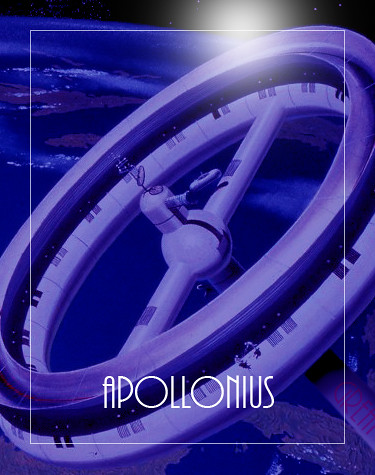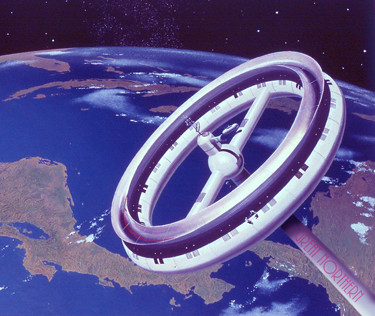
Volume XIX, Issue Ve: Special Book Section
Apollonius
By Bob Kirchman
Copyright © 2020, The Kirchman Studio, all rights reserved
Chapter 2: The Great Northern
The Starship Great Northern rode in Geosynchronous Earth Orbit at Space Station/Assembly Center 005 of the Alaska Autonimous Republic. Indeed the crafty Apollonius had spun a tale of potential benefits to mankind. Also, he had invoked an odd chapter in England’s history where convicts and other undesirables were sent to colonize the remote island sub-continent of Australia and there they established a great nation. From 1788 to 1868, about 160,000 convicts were sent to penal colonies there. It was the unforeseen second chance that gave many Australians a hope and a future. Zimmerman, for his part was always willing to listen to any alternative to incarceration. His own incarceration in a U.S. Federal Prison weighed heavy upon him… that and the notion that Theodor Herzl had put forth that there could indeed be a society without prisons! Apollonius had opened his checkbook and the project had been accomplished in record time to build an interplanetary star ship. Cape Lisbon International Spaceport, for its part, provided new and unheard of economy and reliability putting men and materials in orbit. And so the ship, capable of carrying fifty souls on the nine month journey to mars orbited ‘at anchor’ at SSAC005. The ship was being stocked with 3D printers and plans for much of the space colony’s needed machinery, which would be created on the planet’s surface. The unmanned probe had already been sent and would confirm the resources were there to construct what the colonists required. The plan was to expand from the initial living pods out into a full-scale biosphere, much resembling the one on Big Diomede, to protect the colonists from the effects of Mars’s thin atmosphere which was mainly CO2. In the Zimmerman Organization offices in Wales, greenhouse designs originally created for the tundra were being reconfigured for use on Mars. The parts were also being redesigned for ‘printing’ in factories on the planet itself. Botanists were collecting and cultivating plants that would refresh the atmosphere even as they provided food for the settlers. “Eventually we’ll need to establish a colony of 40,000 people in order to allow for a healthy and diverse stock.” Apollonius had said. Still, the initial mission was defined by the limitations of budget and practicality.
The Great Northern had a forward section with a rotating centrifugal ring to create the sensation of gravity for the passengers and crew. It was compact but comfortable. Portholes in the compartments offset the claustrophobic compactness. The ship had been assembled from components destined for platform SS/AC006, the next orbital station to be built, and fitted with a fusion engine to become a large space-going vessel. The fusion engine was at the end of a long tube to the rear of the configuration and the bridge sat directly in front of the gravity ring section. At the helm was Captain Abiyah Ben Gurion, a veteran of the Israeli Air Force. A thoughtful man who spoke little, he had been at the top of his class in astronaut training and was given the opportunity to pilot the first mission to Mars. There was to be no forced assignment to this mission by Zimmerman’s decree. Even the ’settlers’ were to be volunteers. On this point he had won over Apollonius’s insistence that the crew be chosen by George himself and ordered on the mission. The result was a tight group of hard-core military personnel as crew and an odd mix of adventure seekers and condemned men and women who did not fit into society in the potential pool of settlers. Zimmerman and Apollonius would oversee the final selection. Captain Ben Gurion was typical of the crewmen, a silent loner who kept to himself but was known for his devotion to his fellow airmen. He was not unlike those seamen of old who captained oceangoing vessels under sail. His passion was music and he earned the nickname ’Nemo’ from the fact that he had a little midi keyboard in his cabin and the strains of his music often spilled out into the passageways. The crew loved it and almost never addressed him as anything but.
Nemo would be a man without a country for the duration of the two-year voyage. It would take about nine months to get there and then require about six months of orbiting the planet in a support capacity to the colony. After that, there would be the long return trip. The plan was to rotate crews each trip but Nemo secretly wished he could stay on for longer. “Not to worry,” he thought to himself. “Distinguish yourself in command and there won’t be many who seek to take it from you.”
(to be continued)
[click to read ]
Copyright © 2020, The Kirchman Studio, all rights reserved

